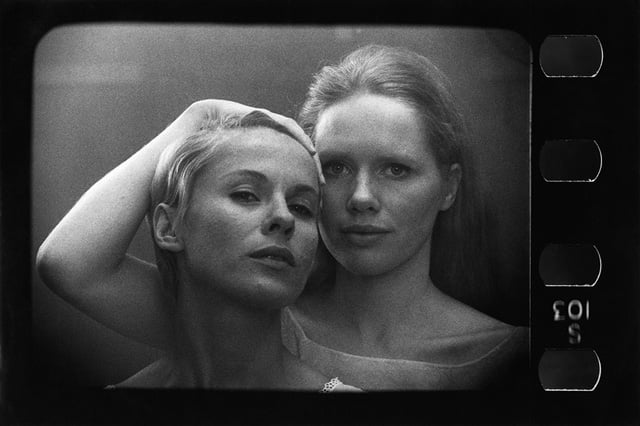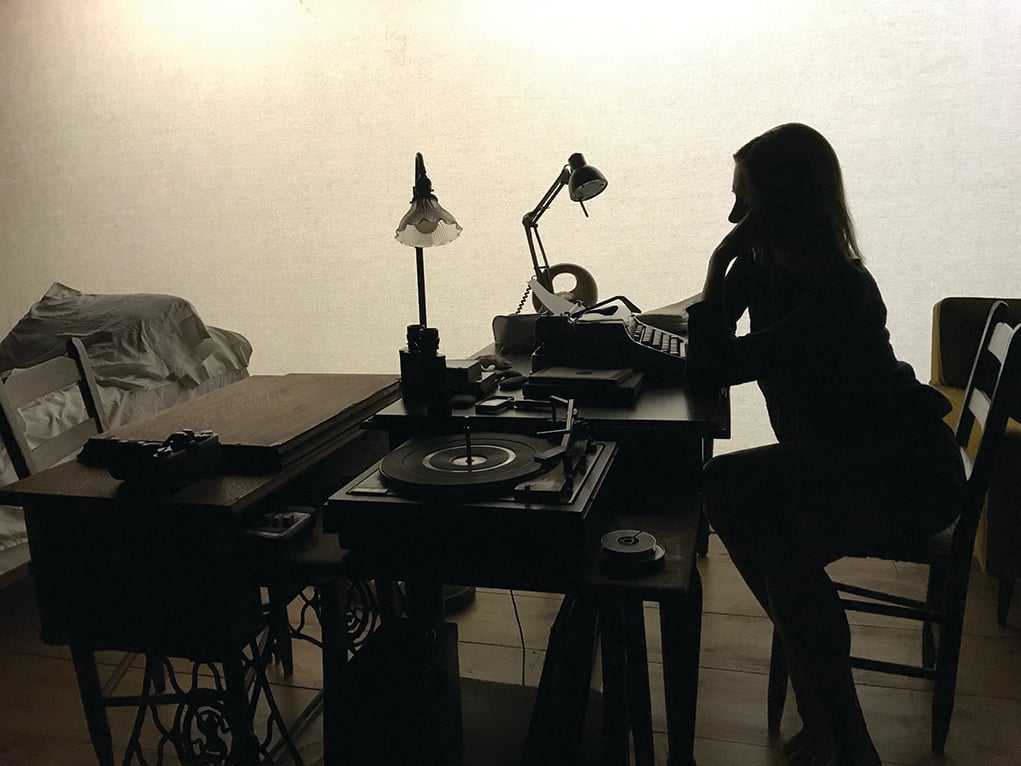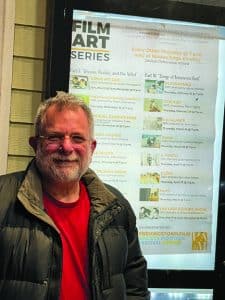Bringing Bergman’s Persona to the Harbor Stage
by Rebecca M. Alvin
In recent times, it has become increasingly common for films to find their way from the big screen to the stage. Usually, they are made into musicals, with most of the original qualities of the movie disappearing into the background behind musical numbers and star-studded Broadway casts. But while the choice to adapt a film for the stage is not an unusual concept, it is when the film is Ingmar Bergman’s Persona, a film that sits atop the canon of cinematic masterpieces. This year, Harbor Stage Company artistic director Robert Kropf selected the film to adapt and direct as part of his tradition of bringing a classic to the stage each summer.
“I love Bergman,” says Kropf the morning after opening night. “There’s something about the depth and the scope of Bergman’s work that feels so profound, similar to The Seagull and all these great writers.” He explains he originally wanted to adapt Bergman’s Scenes from a Marriage but could not get the rights. The Ingmar Bergman Foundation sent him a catalog of suggested alternatives. “I’d known Persona, but it seems like everyone I talked to was like, ‘I wrote my thesis on Persona,’ so I understand that it has that kind of weight to it, but I didn’t really know it, honestly.” Kropf had seen the film but watched it again, and that’s when he knew he had to adapt it. “It was so clear to me, there was just so much opportunity for intimacy and beauty, and also this notion of having a character who doesn’t speak on stage; it had everything.”

Persona is a two-person character study. In the film, a successful actress, Elisabet (Liv Ullman in her first role with Bergman) has made herself mute in response to an existential crisis of sorts. Alma (Bibi Andersson) is the nurse assigned to care for her at a psychiatric hospital. After a brief time at the hospital, the doctor suggests Elisabet needs to retreat to a secluded cottage with Alma along to take care of her. In their time at the cottage, Alma opens up to Elisabet, discussing her deepest secrets, desires, hopes, and sins. As their trust grows, their identities begin to merge.
Few films can match Bergman’s 1966 masterpiece in terms of beauty and complexity, but it is its self-referential quality that makes the film seem an odd choice for a theatrical adaptation. In fact, Persona is as much about cinema itself as it is about identity, human nature, trust, and betrayal. Bergman references the filmmaking process again and again in the film, reminding us that we are watching a movie, not real life. He also uses cinematic techniques like tight close-ups, montage editing, and the incredible cinematography of Sven Nykvist to create what can be seen as a comment on art and life, or cinema and life. The resulting film is intimate, compelling, and deeply layered.

Going into this stage version, Kropf says there was much more emphasis on the set and overall look than things he’s done in the past. “I think because it’s so visual and the stage usually is so language based, that was a challenge… Sven [Nykvist] is such a master, right? So frame for frame it’s just gorgeous… That was challenging to capture that beauty and that stillness and that scope,” Kropf explains.
The play is an unusual experience for the audience in that it is very visual, with a set that extends to the limits of the stage, which in this case, is in an extremely intimate theater to begin with. The lighting also plays an important role as there are scenes that take place with characters partially in silhouette or behind a screen. In this regard, the play is as beautiful to look at in a theatrical sense as the film is in a cinematic sense.
But, Kropf emphasizes, it’s not a case of taking a film and trying to just put it on the stage. It is very much “its own thing.” While Bergman’s film is very much about film itself, Kropf’s adaptation is very much
about theater itself, with self-reflexive moments that break the illusion
of the play in the same way Bergman did in the film.
Anna (Alma in the original film) is played by Harbor
Stage co-founder Brenda Withers and Elsbeth (Elisabet in the film) by actress Jane Stiles O’Hara. For both actresses, it is a demanding play, not the least of which is because Anna speaks in monologue throughout the entire play and Elsbeth is mute, expressing herself only through action, body language, and facial expression. In an art form that is so dependent upon language, directing an actress who doesn’t speak is also a challenge for Kropf, but one he says he enjoyed.

“I’ll tell you it was wonderful. First of all, Jane is just a beautiful, generous, present actress, so we had that going for us from the gate. But I did a few things, and one was that in the rehearsal we struck this deal where whenever we stepped foot in the rehearsal room, she didn’t speak at all as an actor,” he explains. “She never spoke, so we developed this way of communicating where she had to sort of process whatever I was giving her… That was the big idea, to explore that and let her just sort of make choices.”
Around the world there have actually been many stage adaptations of Persona, although not many in the U.S. For Kropf it was about the essence of Bergman’s story and not about simply looking at it in terms of cinematic language.

What is the essence of Persona? That may vary from person to person, but Kropf says, “I’d say it’s about intimacy, and I would say it’s about the image that we present to the world versus our more authentic self. And it’s an exploration of that authenticity and it’s about trust,” he says. Beyond that, he adds, “The biggest part of it is this idea of the courage that it takes to reveal your true self as you would want to do in a relationship, but also this idea of brushing up against dropping out of the culture or the society, choosing to not participate, which could be perceived as a negative choice. I see it as a heroic one.”
Persona is onstage at the Harbor Stage, 15 Kendrick Ave., Wellfleet, Wednesdays through Saturdays at 7:30 p.m. and Sundays at 5 p.m. through September 2, with an added show Tuesday, August 29 at 7:30 p.m. Tickets ($23) are available at the box office or online at harborstage.org. For more information call 508.349.6800.










